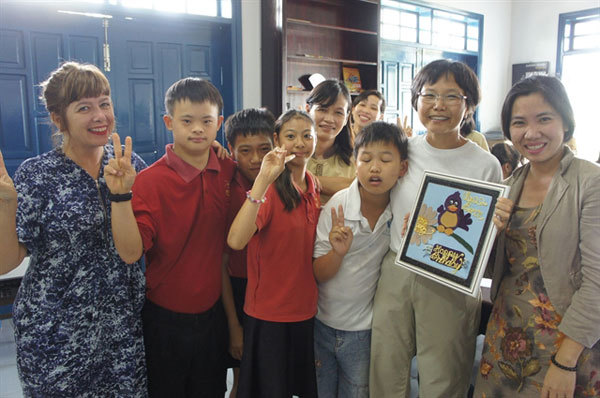Nguyen Bao Khang (eight), Le Minh Chau and Nguyen Xuan Tien Dat (both 11) all have eye impairments.
Teacher Dinh Thi Thu Huong loses herself in training the students. She holds her hands to guide them in each skill.
 |
| Teacher Huong guides a pupil to put a plug into a socket. — VNS Photos Hoang Nam |
In the lesson, lasting for three hours, she guides them to use chopsticks, put water from a big container into small glasses and put a plug into an electrical socket.
To avoid water escaping the glass, she tells the students to put their big finger on the mouth of the glass and listen to the water running.
“It’s difficult to say which skills are easier to teach to such eye-impaired students than others,” Huong told Việt Nam News. “It depends on each student. Some of them are good at these and some others good at those."
For example, Le Minh Chau is good at language and communication skills and music but she struggles with delicate movements like tying up her hair and buttoning her coat, she said.
Chau spent a year learning how to tie her hair up, she said.
Huong said she encouraged their parents to let the students do everything themselves so they can be more independent.
Hoang Thi Tuyet Hang, Chau's mother, explains why she often does simple things for her daughter.
 |
| Le Minh Chau listens to the water running to guess whether the glass is full or not. |
 |
| Huong teaches her student to hang a coat on a chair. |
“We live 15km away from the school,” she said. “We are always in a hurry to get to school every morning. If I let her do her own things, we would be late.
"Also she spends so much time at school and talent classes every day and we have very little time at home to teach her.”
Chau said the class is very helpful to her.
“Teacher Huong shows me by hand the tasks very carefully and repeats them again and again,” Chau said. “She even assigns me homework to practise the skills fluently by myself. I’m fairly confident now that I can do many things alone. I should practise more to be able to do other more challenging skills like washing my hair.”
Huong said such classes are necessary for the visually impaired pupils, who study at normal schools. There are more than 200 visually impaired pupils in the school, which specialises in teaching such pupils from grades 1 to 9.
“Before and together with learning knowledge, the pupils should know how to do simple things by themselves,” she said. “I think it’s even more important than academic knowledge.”
Nguyen Thi Hoa, the mother of Nguyen Bao Khang, accompanies her son to the class every Sunday and said such a class is helpful to the pupils.
“I’m there at the class and learn the way the teacher guides my son,” she said. “I guide him more at home the same way.”
 |
| A parent (left) joins Huong (right) in guiding the pupils to use chopsticks. |
 |
| The pupils even learn how to decorate a Christmas tree. VNS Photos Hoang Nam |
Hoa said Khang was born prematurely after being carried for only six and a half months, meaning his eyes aren't developed enough, so he can only distinguish between light and dark.
“I do my best to spend as much time with him as possible,” she said. “But I want to make sure that he can live independently.”
The class teaches the most basic skills from washing oneself, wearing clothes, to washing up, cooking and fixing things. VNS
Tran Hoang Nam

Technology empowers people with disabilities
Twenty-two people with visual impairments are attending a digital business training and coaching course for four months in Hanoi to help them adapt to the fourth industrial revolution and co-exist with COVID-19.

Fears for future of special needs school in central Vietnam
The founder of a charity in Vietnam who was awarded one of the UK’s highest honours for her work with disabled children fears the doors to her school may soon close forever.